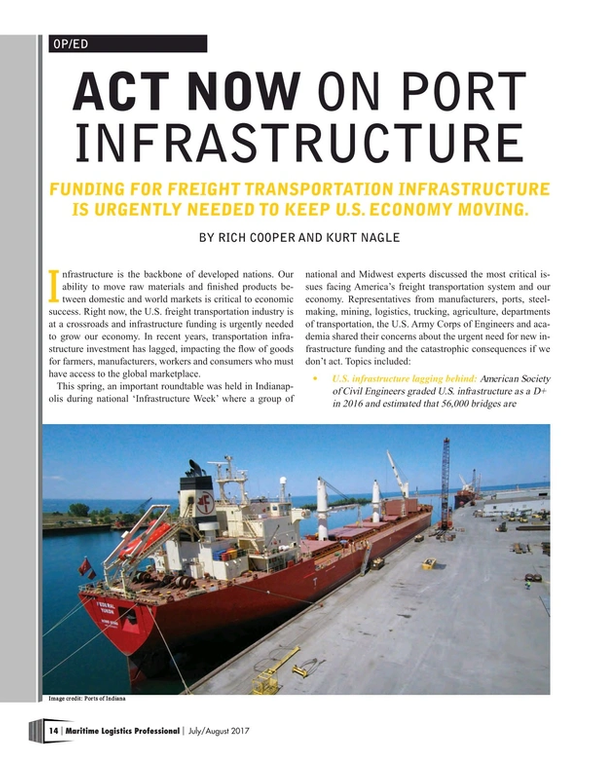
Op/Ed: Act Now on Port Infrastructure
By Rich Cooper and Kurt Nagle
Funding for freight transportation infrastructure is urgently needed to keep U.S. economy moving.
Infrastructure is the backbone of developed nations. Our ability to move raw materials and finished products between domestic and world markets is critical to economic success. Right now, the U.S. freight transportation industry is at a crossroads and infrastructure funding is urgently needed to grow our economy. In recent years, transportation infrastructure investment has lagged, impacting the flow of goods for farmers, manufacturers, workers and consumers who must have access to the global marketplace.
This spring, an important roundtable was held in Indianapolis during national ‘Infrastructure Week’ where a group of national and Midwest experts discussed the most critical issues facing America’s freight transportation system and our economy. Representatives from manufacturers, ports, steelmaking, mining, logistics, trucking, agriculture, departments of transportation, the U.S. Army Corps of Engineers and academia shared their concerns about the urgent need for new infrastructure funding and the catastrophic consequences if we don’t act. Topics included:
- U.S. infrastructure lagging behind: American Society of Civil Engineers graded U.S. infrastructure as a D+ in 2016 and estimated that 56,000 bridges are structurally deficient, while over half of our locks and dams have exceeded their design life. Meanwhile, China lifted 400 million people out of poverty by heavily investing in infrastructure.
- Congestion killing productivity: Road and rail systems are carrying volumes beyond what they were designed for, which increases congestion. American Transportation Research Institute reported congested highways cost the trucking industry $63 billion in 2015 and caused 996 million hours of lost productivity. That’s equal to 362,000 trucks sitting idle for a year.
- 11 million jobs depend on one aging lock: U.S. Department of Homeland Security reported that if the Poe Lock failed for six months, the nation would be plunged into a recession resulting in the loss of 11 million jobs. Rebuilt in 1968, the aging lock is the only feasible passageway for raw materials to get to the U.S. steel industry, and upgrades are critical.
- $66 billion needed for U.S. ports: American Association of Port Authorities has identified a need for $66 billion in federal investments for critical port-related infrastructure over the next 10 years. Meanwhile, the port industry generates $320 billion annually in taxes, supports 23 million jobs and is investing $31 billion per year in infrastructure. Currently, the harbor maintenance taxes paid by shippers are much greater than the federal funds being allocated to maintain our harbors, and that needs to change.
- Indiana’s model could benefit nation: Indiana recently passed groundbreaking legislation that provides $1.2 billion in new annual funding for roads and bridges over the next 20 years. By building a strong coalition and developing a collaborative process for identifying needs and sources of funding, a statewide logistics council was able to build a comfort level with legislators and the public about the need for tax increases. Raising taxes used to be considered a “death knell” for re-elections, but that is no longer the case when it comes to infrastructure.
The answer is … Funding is obviously needed to improve infrastructure, but securing sufficient support for the needed investing requires key components:
- Speak with one voice. This is a non-partisan issue that affects all modes of transportation and essentially every type of business.
- Support a comprehensive national strategy. States have taken the lead on developing highways, but a broader multimodal perspective is needed to invest wisely in a national freight system.
- Act now! It would not be wise to sit idle when the U.S. President is talking about making major investments in our country’s infrastructure. The time is now.
To that end, we call upon federal, state and local leaders to make infrastructure funding a top priority so that we can take our country’s economy to the next level.
The Authors
Kurt Nagle is CEO and President of the American Association of Port Authorities. The American Association of Port Authorities represents 130 of the leading seaport authorities in the U.S., Canada, Latin America and the Caribbean.
Rich Cooper is the Chief Executive Officer at the Ports of Indiana. Established in 1961, the Ports of Indiana is a statewide port authority managing three ports on the Ohio River and Lake Michigan.
(As published in the July/August edition of Maritime Logistics Professional)
Read Op/Ed: Act Now on Port Infrastructure in Pdf, Flash or Html5 edition of Jul/Aug 2017 Maritime Logistics Professional
Other stories from Jul/Aug 2017 issue
Content
- Cyber Attacks Threaten Shipping & Dominate Maritime News page: 10
- Op/Ed: Act Now on Port Infrastructure page: 14
- Today’s Maritime Security: Is the Industry Prepared? page: 16
- Global Bunkers, 2020 and Developing Market Trends page: 26
- Better Times for Box Carriers Ahead? page: 30
- Northwest Seaport Alliance: Innovative, Ideally Located and Together as One page: 37
- Addressing Today’s Shipping Challenges with Software Solutions page: 54
- Changing Box Landscape Demands That Yard Tools Keep Pace page: 58


